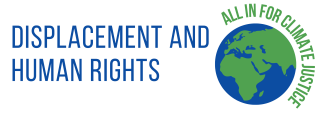Displacement & Human Rights
Each year the Unitarian Universalist Office at the United Nations (UU@UN) hosts an Intergenerational Spring Seminar. The 2022 theme was Displacement and Human Rights: All In for Climate Justice. Because of the ongoing Covid-19 pandemic, and in recognition of the large environmental cost to travel, the 2022 Seminar was held online rather than in-person in New York City.

2022 Seminar: Recordings
- Keynote: Pacific Island Students Fighting Climate Change (YouTube)
- Theme Panel: “There’s No Place Like Home” (YouTube) with:
- Amali Tower: Founder & Executive Director, Climate Refugees
- Salote Soqo: Advocacy and Global Displacement Director, UUSC
- Noella Prescod: Senior Youth Dean, 2022 UU@UN Spring Seminar Planning Committee
- Moderated by Bruce Knotts: Director, UU@UN
- Workshop: “Climate Displacement is Everywhere” (YouTube) with Louisiana folklorist Maida Owens
- Workshop: “Gearing Up for Change” (YouTube) with:
- Teaghan McLaughlin: Youth Dean, 2022 UU@UN Spring Seminar Planning Committee
- Noella Prescod: Senior Youth Dean, 2022 UU@UN Spring Seminar Planning Committee
- Rachel Myslivy: Climate Justice Organizer, Side With Love Organizing Strategy Team
- Stevie Carmody: Adult Dean, 2022 UU@UN Spring Seminar Planning Committee
Displacement and Human Rights: All In for Climate Justice
The 2022 Intergenerational Spring Seminar was hosted by the UUA Office at the UN (UU@UN) in partnership with Unitarian Universalist Ministry for Earth (UUMFE), Unitarian Universalist Service Committee (UUSC), and Side With Love, and is part of UUMFE’s Spring for Change — A Season of Sacred Activism, whose message this year is “Get Rooted, Get Ready!” Continuing the 2020 and 2021 Seminar theme “All In for Climate Justice,” the 2022 Seminar will focus specifically on climate-forced displacement, human rights, and building community resilience. The UU@UN and 2022 Seminar Planning Team have spent many months deepening our understanding of this complex theme and how the Seminar will address it.
Climate-Forced Displacement
Climate-forced displacement is when humans have no choice but to leave their land due to the long-lasting effects of climate change. Climate Change has been an increasing threat to humanity and can be seen globally on many different scales ranging from natural disasters, coastal flooding, droughts, crop failures, wildfires, and more. With global temperatures rising upwards of 1 degree Celsius above pre-industrial levels, and still rising, severe climate events have been on the rise and continue to cause harmful displacement. For certain small island and coastal states, this is an existential threat. Rising sea levels can result in fully unlivable land and entire populations having to leave their country behind. For so many communities, the threat of climate change means rethinking how and where they can live.
The World Bank’s 2021 Groundswell report estimated that climate-forced displacement could affect up to 216 million people throughout six world regions by 2050. The people displaced will need to find new housing and new jobs, and if they are unable to move within their country, they will need to fight for safe asylum elsewhere. Climate change is not currently recognized by the United Nations as a cause for someone to qualify as a refugee, so legal protections are needed on an international level to affirm the rights of these millions on the move. It is crucial we act now to prevent further damage to our Earth to lessen the number of people forced to leave their homes because of the climate crisis.
2022 Seminar Objectives
The mission of the 2022 Intergenerational Spring Seminar is to instill in Unitarian Universalist youth and adults a commitment to global engagement and the skills to take action locally toward the following goals:
- End colonial oppression and climate destruction; Protect the rights and sovereignty of those most impacted by climate destruction.
- Build community resilience to address the causes and consequences of climate-forced displacement.
The following objectives describe the planning process and inform the trajectory of learning for the Seminar itself. These are the core values that the Seminar Planning Committee has held in our work.
Partnership, Mutuality, Sustainability, Justice, Equity, Accountability
- Call for human rights and sovereignty to be respected for Indigenous, Black, and people of color communities whose lives, lands, and water are endangered by climate change and colonial oppression.
- Affirm the UN Declaration on the Rights of Indigenous Peoples.
- Center solutions and leadership from those who have lived experience with climate-forced displacement, climate change, and systemic oppression, particularly Black, Indigenous, and people of color communities.
- Highlight the intersectionality of the climate and displacement crisis, and how climate injustice is connected to other forms of oppression.
- Offer clear pathways and resources for attendees to connect with existing programs and organizations for long-term engagement, both as individuals and as congregations or other communities.
- Give prominence to those who have been in this work for a long time and know how to do it effectively.
- Amplify and support youth and young adult leadership.
- Foster partnership and mutuality in relationships; accompany invitations with offers of support.
- Acknowledge and take responsibility for the colonial history and present that implicate U.S. and Canadians and UUs, as well as the outsize climate impact of U.S. and Canada in the world.
- Model practices for environmental sustainability and sustainable personal engagement (especially attending to mental health and spiritual resilience).
Transparency, Approachability, Accessibility
- Enact transparent safety protocols (both Covid-19 safety and youth safety), explaining both what the rules are and why they’re implemented.
- Offer personal connections; embrace informality and a non-intimidating atmosphere.
- Practice Preemptive Radical Inclusion as described by CB Beal (design spaces assuming everyone is already in the room).
Resources for Further Engagement with Displacement & Human Rights
Check out this climate-forced displacement resource from UUSC (pdf)
Read this blog post from UU@UN Summer 2021 Intern Andrew Mickle “Confronting Climate-Forced Displacement with Global Compassion”